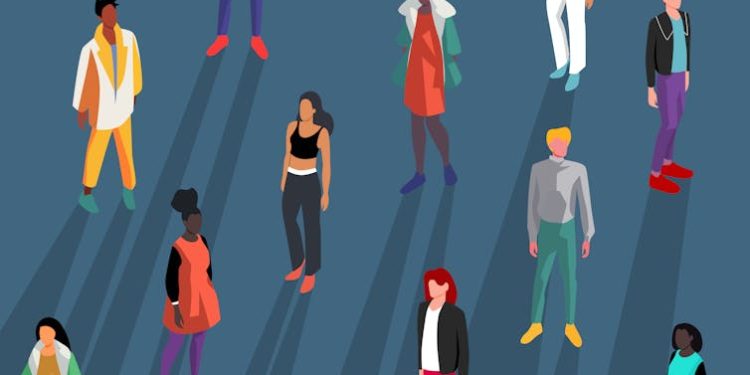Do you remember the COVID-19 shutdowns?
Many Americans could no longer do the activities they enjoyed once businesses, schools, churches, gyms and community organizations shut their doors. Even spending time with friends and family became nearly impossible.
Now imagine living that kind of isolation all the time.
For millions of Americans with serious mental health conditions, being unable to engage in meaningful activities is not just a temporary crisis – it’s daily life.
Community inclusion refers to everyone’s right to participate in meaningful social roles. This includes working, going to school, practicing one’s faith or simply connecting with others in shared activities.
Yet, for the estimated 15.4 million U.S. adults living with significant mental health conditions – about 6% of the adult population – community inclusion is far from guaranteed. Compared with the general population, they are far less likely to be involved in social activities that bring purpose and connection, as well as health benefits.
I am a psychologist who has worked in inpatient and outpatient psychiatric settings, and I directed a federally funded research and training center at Temple University in Philadelphia for more than 20 years that focuses on independent living and participation of people with serious mental illnesses.
My colleagues and I have conducted research which demonstrates that people with such conditions want to participate in their community just like everyone else. We also found that they can do so – with proper supports like medications, therapy, rehabilitation services and communities making reasonable accommodations for them. And furthermore, they should: Community inclusion is good for their health.
Table of Contents
Benefits of community life
Community involvement gets people with mental illness out of bed and out of the house. It encourages movement and activity, which enhances physical health.
This is especially critical because people with serious mental illnesses die 15 to 20 years earlier than the general population – often due to preventable illnesses like diabetes, cancer and cardiovascular disease.
Regular participation in life’s routines provides social and emotional stimulation that also boosts cognitive functioning, like memory and problem-solving, and reduces depression and loneliness.
Namthip Muanthongthae/Moment Collection via Getty Images
What really causes exclusion
Some people may assume that people with severe mental illnesses are restricted from active participation in their communities solely due to the mental health symptoms themselves.
For example, they might think that cognitive issues related to schizophrenia make it too difficult for people to work or go to school; or that mania, anxiety and depression prevent them from having good relationships with others.
But environment also plays a major role.
The social model of disability suggests that people are not disabled by their diagnosis. Instead, they experience a disability through limitations in their communities because of physical, structural and social barriers.
For example, someone with anxiety or depression may be penalized in a college class that deducts points for students who do not speak up.
A person with a disability that causes fluctuating moods or low energy might not succeed in a rigid nine-to-five job without accommodations.
And a churchgoer who talks to themselves or has to walk around during services because their medications make them jittery – a condition called akathisia – or who is known to have been diagnosed with schizophrenia might be asked to leave because their presence makes others uncomfortable.
The result is that people are unable to participate not simply because of an impairment, but because of an environment that does not accommodate or appreciate their unique attributes.
Helping people with mental illness rejoin community life
Some programs here in Pennsylvania are working to change that.
Education Plus helps Philadelphia residents with mental health conditions complete college and financial aid application forms, obtain school accommodations for their disability, and develop good study habits or learn to ask for help from their instructors.
Pathways to Housing PA offers transitional job opportunities to people who have been homeless, and organizes picnics, trips to Phillies baseball games and other fun activities that create a sense of community belonging.
A voter access initiative at an inpatient psychiatric facility in Pennsylvania helps patients check their voter registration status, register to vote and apply for mail-in ballots.
The nonprofit Compeer in suburban Philadelphia connects community volunteers to people with mental illnesses to engage in mutual leisure or educational interests. This oftentimes leads to long-term friendships.
And a current study I am conducting is examining ways to support faith communities in Montgomery County to be more welcoming and embracing of individuals with mental illnesses.
zamrznutitonovi/iStock/Getty Images Plus via Getty Images
What you can do
Family members, friends and mental health professionals can simply ask people with mental illnesses about their interests – whether it’s employment, going to school, dating or making new friends – and then encourage and support them in pursuing those interests.
Creating inclusive communities means not just offering services to people with serious mental illness, but also changing negative beliefs and behaviors toward them. This includes embracing people who might express emotions differently, require flexibility or simply behave in ways we’re not used to.
For example, say you’re in a coffee shop and encounter a person who is muttering to themselves and may not have bathed in a few days. Maybe you make eye contact, smile and say hello. Certainly reconsider complaining.
It takes empathy, open-mindedness and patience to create a community that welcomes people with mental illness and increases the likelihood that they can participate in society like everyone else.
Read more of our stories about Philadelphia.
























